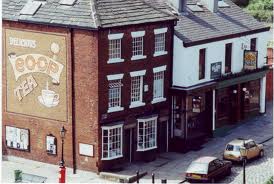
The Co-operative Museum, Toad Lane, Rochdale, where the Co-operative Movement began in 1844. The Toad Lane Store has been a Museum since 1931 devoted to the story of the Rochdale Pioneers.
It’s worth visiting the Co-operative Museum on Toad Lane, Rochdale. The layout of the building is the same as the original co-op, when founded in 1844.
Retail co-ops addressed more than one issue, eg food adulteration; the Rochdale Pioneers wanted to sell food that could be trusted at affordable prices (honest food at honest prices). Note how the issue of how we regulate the market place recurs throughout history.
Above the shop there was and still is a library that was also used for lectures. Education and self-development were integral to the co-operative ideal from the start.
The customers owned the shop and who received a dividend; a share of the profits. As the movement spread across the country, many people joined hundreds of small retail co-ops and certainly my parents’ generation were able to quote their divi number as late as the early 2000s.
The business did not expand from Toad Lane; the idea spread and hundreds of similar retail co-ops started all over the UK. In Sheffield, there were 2 co-ops during my childhood. Brightside and Carbrook (B&C) started with the signing of a document around the anvil at Jessop’s Mill, following an inspirational visit from a retail co-op in Keighley. The other was the Ecclesall Co-op on the other side if the city.
The movement developed the Co-operative Wholesale Society (CWS) in 1863 to supply the many retail co-ops. They were the first nationwide wholesalers anywhere in the world, developing warehousing and shipping, railway lines to bring goods to local co-ops. The large supermarkets that sprang up from the 1960s onwards copied the co-operative movement.
The building that housed the first ever department store is next door to the Toad Lane museum and yes, it was a co-op.
Co-operative principles spread like wildfire and inspired many other ventures. Almost all the financial institutions available to the public today have their origins in co-operation. Very little started as politicians’ initiatives, they all grew from the bottom up. Insurance, building societies, penny banks, friendly societies, educational and scientific institutions, educational associations, libraries, they all originated out of mutual movements.
I mention this history to underline there is precedence for building the economy from below, indeed from below is the only way to do it!
Why do you think we have forgotten about mutuals in the last 50 years? Or do you know of places where mutuals are still strong?